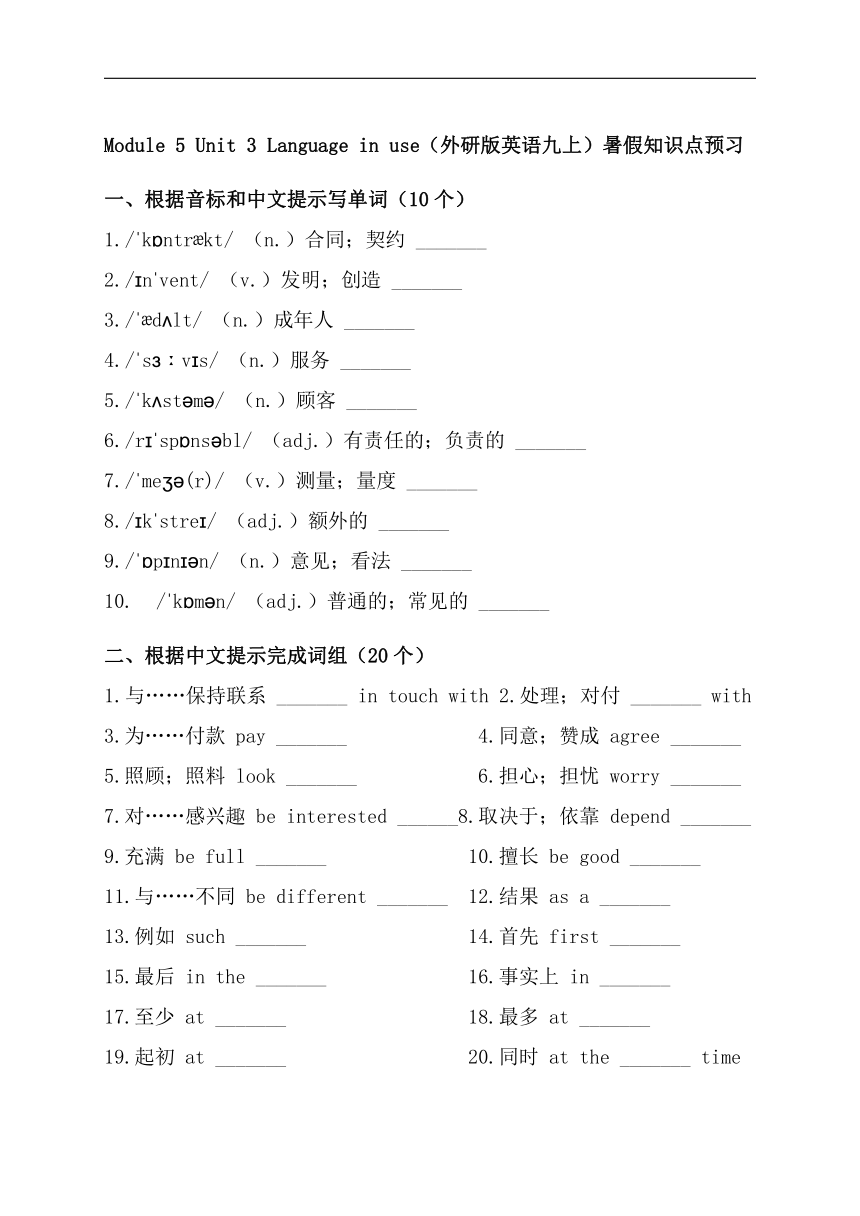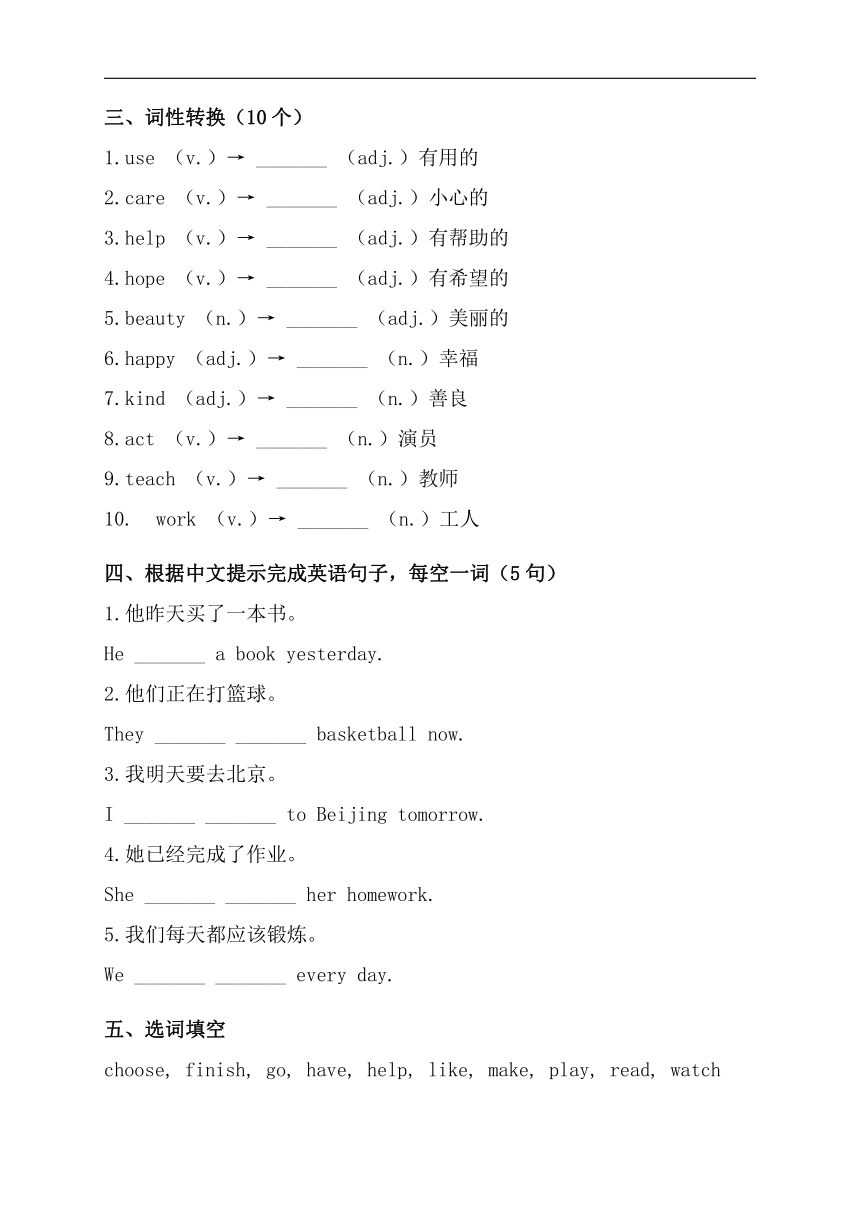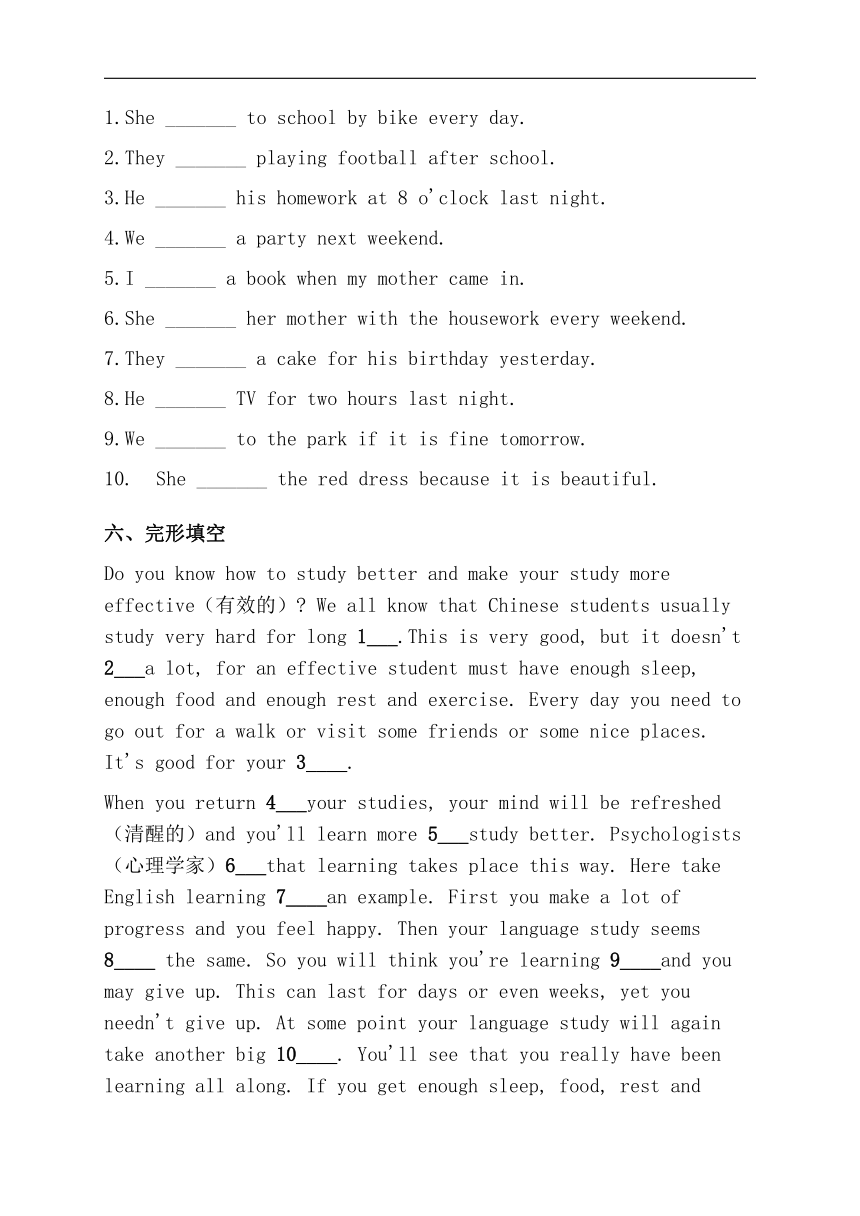Module 5 Unit 3 Language in use知识点预习(含答案) 2025-2026学年外研版英语九年级上册
文档属性
| 名称 | Module 5 Unit 3 Language in use知识点预习(含答案) 2025-2026学年外研版英语九年级上册 |

|
|
| 格式 | docx | ||
| 文件大小 | 21.8KB | ||
| 资源类型 | 教案 | ||
| 版本资源 | 外研版 | ||
| 科目 | 英语 | ||
| 更新时间 | 2025-07-09 14:45:34 | ||
图片预览



文档简介
Module 5 Unit 3 Language in use(外研版英语九上)暑假知识点预习
一、根据音标和中文提示写单词(10个)
/ k ntr kt/ (n.)合同;契约 _______
/ n vent/ (v.)发明;创造 _______
/ d lt/ (n.)成年人 _______
/ s v s/ (n.)服务 _______
/ k st m / (n.)顾客 _______
/r sp ns bl/ (adj.)有责任的;负责的 _______
/ me (r)/ (v.)测量;量度 _______
/ k stre / (adj.)额外的 _______
/ p n n/ (n.)意见;看法 _______
/ k m n/ (adj.)普通的;常见的 _______
二、根据中文提示完成词组(20个)
与……保持联系 _______ in touch with 2.处理;对付 _______ with
3.为……付款 pay _______ 4.同意;赞成 agree _______
5.照顾;照料 look _______ 6.担心;担忧 worry _______
7.对……感兴趣 be interested ______8.取决于;依靠 depend _______
9.充满 be full _______ 10.擅长 be good _______
11.与……不同 be different _______ 12.结果 as a _______
13.例如 such _______ 14.首先 first _______
15.最后 in the _______ 16.事实上 in _______
17.至少 at _______ 18.最多 at _______
19.起初 at _______ 20.同时 at the _______ time
三、词性转换(10个)
use (v.)→ _______ (adj.)有用的
care (v.)→ _______ (adj.)小心的
help (v.)→ _______ (adj.)有帮助的
hope (v.)→ _______ (adj.)有希望的
beauty (n.)→ _______ (adj.)美丽的
happy (adj.)→ _______ (n.)幸福
kind (adj.)→ _______ (n.)善良
act (v.)→ _______ (n.)演员
teach (v.)→ _______ (n.)教师
work (v.)→ _______ (n.)工人
四、根据中文提示完成英语句子,每空一词(5句)
他昨天买了一本书。
He _______ a book yesterday.
他们正在打篮球。
They _______ _______ basketball now.
我明天要去北京。
I _______ _______ to Beijing tomorrow.
她已经完成了作业。
She _______ _______ her homework.
我们每天都应该锻炼。
We _______ _______ every day.
五、选词填空
choose, finish, go, have, help, like, make, play, read, watch
She _______ to school by bike every day.
They _______ playing football after school.
He _______ his homework at 8 o'clock last night.
We _______ a party next weekend.
I _______ a book when my mother came in.
She _______ her mother with the housework every weekend.
They _______ a cake for his birthday yesterday.
He _______ TV for two hours last night.
We _______ to the park if it is fine tomorrow.
She _______ the red dress because it is beautiful.
六、完形填空
Do you know how to study better and make your study more effective(有效的) We all know that Chinese students usually study very hard for long 1___.This is very good, but it doesn't 2___a lot, for an effective student must have enough sleep, enough food and enough rest and exercise. Every day you need to go out for a walk or visit some friends or some nice places. It's good for your 3____.
When you return 4___your studies, your mind will be refreshed(清醒的)and you'll learn more 5___study better. Psychologists(心理学家)6___that learning takes place this way. Here take English learning 7____an example. First you make a lot of progress and you feel happy. Then your language study seems 8____ the same. So you will think you're learning 9____and you may give up. This can last for days or even weeks, yet you needn't give up. At some point your language study will again take another big 10____. You'll see that you really have been learning all along. If you get enough sleep, food, rest and exercise, studying English can be very effective and interesting. Don't give up along the way. Learn slowly and you're sure to get a good result.
A. days B. time C. hours D. weeks
A. help B. give C. make D. take
A. health B. body C. study D. life
A. after B. for C. at D. to
A. yet B. and C. or D. but
A. have found B. have taught C. told D. said
A. with B. for C. as D. to
A. to have B. to make C. to take D. to stay
A. something B. anything C. nothing D. everything
A. work B. jump C. walk D. result
七、阅读理解
Do you know that man He is my uncle. His name is David Smith. He is forty-eight this year. He is a worker. He works in a car factory. His factory is not near his home, so he gets up early in the morning and takes a bus to work. At about seven thirty, he gets to his factory. He makes the parts(零件)of the car. He makes many every day. He works very hard. Everyone likes him and says he is a good worker. He has his lunch in the factory. He often plays basketball after work. In the evening, he learns Chinese at home. His Chinese is good, too. Sometimes he helps me with my Chinese. I like my uncle very much.
根据短文内容,选择最佳答案。
( )1.What does David do
A. A teacher. B. A worker. C. A doctor. D. A driver.
( )2.How old is David
A. 46. B. 47. C. 48. D. 49.
( )3.How does David go to work
A. By bike. B. By bus. C. By car. D. On foot.
( )4.Where does David have lunch
A. At home. B. In the factory. C. In a restaurant. D. At school.
( )5.What does David do after work
A. He plays basketball. B. He learns English.
C. He watches TV. D. He reads books.
答案
一、1. contract 2. invent 3. adult 4. service 5. customer 6. responsible 7. measure 8. extra 9. opinion mon
二、1. keep 2. deal 3. for 4. with 5. after 6. about 7. in 8. on 9. of 10. at 11. from 12. result 13. as 14. of all 15. end 16. fact 17. least 18. most 19. first 20. same
三、1. useful 2. careful 3. helpful 4. hopeful 5. beautiful 6. happiness 7. kindness 8. actor 9. teacher 10. worker
四、1. bought 2. are playing 3. will go 4. has finished 5. should exercise
五、1. goes 2. like 3. finished 4. will have 5. was reading 6. helps 7. made 8. watched 9. will go 10. chooses
六、1. C 2. A 3. C 4. D 5. B 6. A 7. C 8. D 9. C 10. B
七、1. B 2. C 3. B 4. B 5. A
一、根据音标和中文提示写单词(10个)
/ k ntr kt/ (n.)合同;契约 _______
/ n vent/ (v.)发明;创造 _______
/ d lt/ (n.)成年人 _______
/ s v s/ (n.)服务 _______
/ k st m / (n.)顾客 _______
/r sp ns bl/ (adj.)有责任的;负责的 _______
/ me (r)/ (v.)测量;量度 _______
/ k stre / (adj.)额外的 _______
/ p n n/ (n.)意见;看法 _______
/ k m n/ (adj.)普通的;常见的 _______
二、根据中文提示完成词组(20个)
与……保持联系 _______ in touch with 2.处理;对付 _______ with
3.为……付款 pay _______ 4.同意;赞成 agree _______
5.照顾;照料 look _______ 6.担心;担忧 worry _______
7.对……感兴趣 be interested ______8.取决于;依靠 depend _______
9.充满 be full _______ 10.擅长 be good _______
11.与……不同 be different _______ 12.结果 as a _______
13.例如 such _______ 14.首先 first _______
15.最后 in the _______ 16.事实上 in _______
17.至少 at _______ 18.最多 at _______
19.起初 at _______ 20.同时 at the _______ time
三、词性转换(10个)
use (v.)→ _______ (adj.)有用的
care (v.)→ _______ (adj.)小心的
help (v.)→ _______ (adj.)有帮助的
hope (v.)→ _______ (adj.)有希望的
beauty (n.)→ _______ (adj.)美丽的
happy (adj.)→ _______ (n.)幸福
kind (adj.)→ _______ (n.)善良
act (v.)→ _______ (n.)演员
teach (v.)→ _______ (n.)教师
work (v.)→ _______ (n.)工人
四、根据中文提示完成英语句子,每空一词(5句)
他昨天买了一本书。
He _______ a book yesterday.
他们正在打篮球。
They _______ _______ basketball now.
我明天要去北京。
I _______ _______ to Beijing tomorrow.
她已经完成了作业。
She _______ _______ her homework.
我们每天都应该锻炼。
We _______ _______ every day.
五、选词填空
choose, finish, go, have, help, like, make, play, read, watch
She _______ to school by bike every day.
They _______ playing football after school.
He _______ his homework at 8 o'clock last night.
We _______ a party next weekend.
I _______ a book when my mother came in.
She _______ her mother with the housework every weekend.
They _______ a cake for his birthday yesterday.
He _______ TV for two hours last night.
We _______ to the park if it is fine tomorrow.
She _______ the red dress because it is beautiful.
六、完形填空
Do you know how to study better and make your study more effective(有效的) We all know that Chinese students usually study very hard for long 1___.This is very good, but it doesn't 2___a lot, for an effective student must have enough sleep, enough food and enough rest and exercise. Every day you need to go out for a walk or visit some friends or some nice places. It's good for your 3____.
When you return 4___your studies, your mind will be refreshed(清醒的)and you'll learn more 5___study better. Psychologists(心理学家)6___that learning takes place this way. Here take English learning 7____an example. First you make a lot of progress and you feel happy. Then your language study seems 8____ the same. So you will think you're learning 9____and you may give up. This can last for days or even weeks, yet you needn't give up. At some point your language study will again take another big 10____. You'll see that you really have been learning all along. If you get enough sleep, food, rest and exercise, studying English can be very effective and interesting. Don't give up along the way. Learn slowly and you're sure to get a good result.
A. days B. time C. hours D. weeks
A. help B. give C. make D. take
A. health B. body C. study D. life
A. after B. for C. at D. to
A. yet B. and C. or D. but
A. have found B. have taught C. told D. said
A. with B. for C. as D. to
A. to have B. to make C. to take D. to stay
A. something B. anything C. nothing D. everything
A. work B. jump C. walk D. result
七、阅读理解
Do you know that man He is my uncle. His name is David Smith. He is forty-eight this year. He is a worker. He works in a car factory. His factory is not near his home, so he gets up early in the morning and takes a bus to work. At about seven thirty, he gets to his factory. He makes the parts(零件)of the car. He makes many every day. He works very hard. Everyone likes him and says he is a good worker. He has his lunch in the factory. He often plays basketball after work. In the evening, he learns Chinese at home. His Chinese is good, too. Sometimes he helps me with my Chinese. I like my uncle very much.
根据短文内容,选择最佳答案。
( )1.What does David do
A. A teacher. B. A worker. C. A doctor. D. A driver.
( )2.How old is David
A. 46. B. 47. C. 48. D. 49.
( )3.How does David go to work
A. By bike. B. By bus. C. By car. D. On foot.
( )4.Where does David have lunch
A. At home. B. In the factory. C. In a restaurant. D. At school.
( )5.What does David do after work
A. He plays basketball. B. He learns English.
C. He watches TV. D. He reads books.
答案
一、1. contract 2. invent 3. adult 4. service 5. customer 6. responsible 7. measure 8. extra 9. opinion mon
二、1. keep 2. deal 3. for 4. with 5. after 6. about 7. in 8. on 9. of 10. at 11. from 12. result 13. as 14. of all 15. end 16. fact 17. least 18. most 19. first 20. same
三、1. useful 2. careful 3. helpful 4. hopeful 5. beautiful 6. happiness 7. kindness 8. actor 9. teacher 10. worker
四、1. bought 2. are playing 3. will go 4. has finished 5. should exercise
五、1. goes 2. like 3. finished 4. will have 5. was reading 6. helps 7. made 8. watched 9. will go 10. chooses
六、1. C 2. A 3. C 4. D 5. B 6. A 7. C 8. D 9. C 10. B
七、1. B 2. C 3. B 4. B 5. A
同课章节目录
- Module 1 Wonders of the world
- Unit 1 It's more than 2,000 years old.
- Unit 2 The Grand Canyon was not just big.
- Unit 3 Language in use
- Module 2 Public holidays
- Unit 1 My family always go somewhere interesting a
- Unit 2 We have celebrated the festival since the f
- Unit 3 Language in use
- Module 3 Heroes
- Unit 1 She trained hard,so she became a great play
- Unit 2There were few doctors, so he had to work ve
- Unit 3 Language in use
- Module 4 Home alone
- Unit 1 I can look after myself, although it won’t
- Unit 2 I became so bored with their orders that I
- Unit 3 Language in use
- Module 5 Museums
- Unit 1 Don't cross that rope!
- Unit 2 If you ever go to London, make sure you vis
- Unit 3 Language in use
- Module 6 Problems
- Unit 1 If I start after dinner, I'll finish it be
- Unit 2 If you tell him the truth now, you will sho
- Unit 3 Language in use
- Revision Module A
- Module 7 Great books
- Unit 1 We're still influenced by Confucius's idea
- Unit 2 It is still read and loved.
- Unit 3 Language in use
- Module 8 Sports life
- Unit 1 Daming wasn't chosen for the team last time
- Unit 2 He was invited to competitions around the w
- Unit 3 Language in use
- Module 9 Great inventions
- Unit 1 Will computers be used more than books in t
- Unit 2 Will books be replaced by the Internet?
- Unit 3 Language in use
- Module 10 Australia
- Unit 1 I have some photos that I took in Australia
- Unit 2 The game that they like most is Australian
- Unit 3 Language in use
- Module 11 Photos
- Unit 1 He's the boy who won the photo competition
- Unit 2 The photo which we liked best was taken by
- Unit 3 Language in use
- Module 12 Save our world
- Unit 1 If everyone starts to do something, the wor
- Unit 2 Repeat these three words daily: reduce, reu
- Unit 3 Language in use
- Revision Module B
